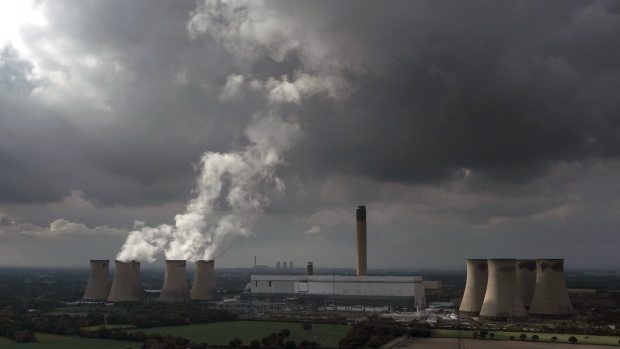Jul 27, 2022
Drax Green Credentials Under Review as Campaigners Cry Foul
, Bloomberg News

(Bloomberg) -- UK power generator Drax Group Plc is under mounting scrutiny following a complaint by environmental campaigners that it’s misleading consumers about its greenhouse gas emissions.
The Organisation for Economic Cooperation and Development said it’s reviewing an allegation that Drax’s claim that it produces “carbon-neutral” electricity from burning biomass is wrong. Such criticism could be particularly embarrassing for a company that describes itself as the UK’s largest source of renewable energy.
Climate groups and investors have been stepping up pressure on energy firms to slash polluting emissions, leading to a slew of commitments from power companies to oil majors to reach “net zero.” With that has come increased concerns about greenwashing -- when businesses exaggerate the environmental benefits of their products or practices to enhance their image.
“After conducting an initial assessment of the complaint, the UK National Contact Point has decided that this complaint merits further consideration” and will offer mediation to both parties, it said in a statement.
The Forest Litigation Collaborative, a group that includes the nonprofit Lifescape Project, argues that Drax doesn’t count the CO2 instantaneously released when it burns biomass at its power stations, and that those emissions make it the UK’s largest single source of carbon dioxide. The group alleges that several statements on Drax’s website relating to its use of biomass are misleading and violate OECD guidelines on responsible business conduct.
“The UK National Contact Point’s decision in their initial assessment does not mean that it considers Drax to have acted inconsistently with the OECD Guidelines,” Drax said in a statement. “We are engaging with the NCP on the next steps in this process.”
Drax’s plant in northern England burns wood largely sourced from forests in North America. Its claim to zero emissions is based on United Nations reporting rules, which state that the CO2 impact of biomass is accounted for in the country where the trees are felled, not in the energy sector.
But the UN says this approach is intended to prevent “double counting” of carbon removal and should not be used to prove biomass’s carbon neutrality.
The FLC also takes aim at Drax’s claim to have cut emissions by 90% since it started a switch to biomass from coal a decade ago. That figure does not account for the climate impact of burning the wood pellets, which the FLC says produces more carbon emissions per unit of energy than coal.
Drax says on its website that it doesn’t burn whole trees, and only uses wood that’s left over after forests are harvested for other uses. It argues that this waste wood would be left to rot anyway, so turning it into pellets doesn’t produce any more CO2 than would otherwise be emitted.
The campaigners claim to have evidence that Drax is using whole trees at its pellet plants and is felling them on an industrial scale.
Thorny Issue
The UK government said last year that biomass energy and carbon capture are key components of its plan to reach net-zero emissions by 2030. But the role of wood-based biomass in tackling climate change has long been controversial. Multiple academic reports have concluded that felling trees for energy releases CO2 into the air much faster than the next generation of trees can absorb it.
Drax said last year that it planned to double its biomass output by 2030. It also said it would invest heavily in carbon capture and storage, with a view to being carbon-negative by that time.
The firm received more than 982 million pounds ($1.2 billion) in renewables subsidies from British taxpayers in 2021, or about 2.7 million pounds a day.
“Drax continues to mislead the public and investors, pocketing billions in publicly funded renewable-energy subsidies while claiming to positively impact the environment,” Elsie Blackshaw-Crosby, managing lawyer at the Lifescape Project, said in a statement. The group seeks to create, restore and protect wild landscapes.
©2022 Bloomberg L.P.






